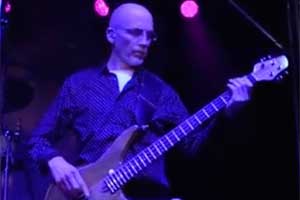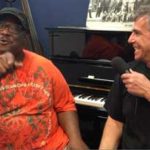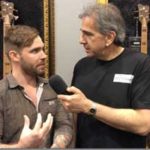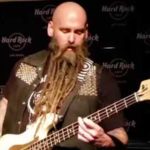FBPO goes one-on-one with the bassist of the newly-reformed British progressive rock band, Curved Air!
Exclusive interview with FBPO’s Jon Liebman
May 21, 2012
Chris Harris has been playing music for some thirty years, beginning with piano at age 8, then teaching himself to play drums and bass at age 14. In addition to having been a member of Curved Air since its reformation in 2008, Chris has also performed with Ian Briggs & the Supervampers (with Ian Briggs of the Yardbirds fame), Darryl Way’s solo band and various freelance writing, recording and teaching gigs throughout the UK and abroad.
FBPO: Tell me about your musical upbringing.
CH: My mother plays piano and has been singing in choirs for over forty years, so when I was little I was surrounded by music. There was an upright piano in the house, which I used to plonk around on, making unmusical noises. My aunt played piano in shows and was an excellent sight reader and a cousin’s father used to play piano for the silent movies in the 1920s. I had lessons on piano and got to about grade 2, but suddenly piano wasn’t cool and I changed schools so my lessons stopped. I sang along with Beach Boys albums, doing the high harmonies, as I’m actually a counter-tenor, and I found it all kind of fun and distracting as I wasn’t a great academic. I spent most of my time in the music department at school, skipping lessons.
FBPO: How did you become a bass player?
CH: The usual process at school. I started on drums when a schoolmate said there was a new drum kit in the music department. We went in one day and I found I could actually play the thing without any effort. I just sort of knew what to do! A few months later, some of us formed a band, but there were three drummers and a guitarist, so I decided to change to bass to avoid any arguments. I bought my first bass a month later. It was a 3/4 size ’51 P-bass copy made by a company called Angelica. By the way, I went to the same School as Chris Wolstenholme of Muse, but a lot earlier than he did!
FBPO: Who were your influences as a young, up-and-coming bassist?
CH: Early influences were wide and varied. On the one hand, it would be Mike Rutherford (Genesis), for the difficult time signatures and complex playing, through to Mark King (Level 42), for slap, Adrian Shaw of late ’70s Hawkwind and Derek Forbes (Simple Minds) for grooves and tones. Even Alan Lancaster (Status Quo) for just learning how to play and hearing things like intervals and counting bars.
FBPO: At what point did your career begin to take off? Was there a defining moment? One gig in particular?
CH: There wasn’t any real “career taking off” moment for me, although joining Curved Air was definitely a move up the ladder. I’ve always gigged in a variety of bands regularly, as I can play just about any style reasonably well. I guess Darryl (Way) ringing me in 2001 could be described as the most marked jump in the biz for me.
FBPO: How did the Curved Air gig come about? What led up to that call?
CH: Back in 2001, I had a call from a guitarist I worked with quite a lot and he said, “a guy called Darryl Way is looking for a bass player for his band and I told him you were available, so don’t say no!” I met Darryl and we seemed to get on okay, so we started rehearsing for some festivals in the west of England, playing original material written entirely by Darryl, with the bass parts scored out. The band did some work for Miles Copeland in Greece, backing French rock opera singer Emma Shapplin. We came back to the UK and Darryl renamed the band Verisma and we did an album. We played a few more events and after that project had run its course, I went back to teaching bass at college and gigging locally. I kept in touch with Darryl because he was always asking how good my sight reading was. Then in 2008 he called me and said Curved Air were reforming and would I be interested in playing bass. Of course I said I’d do an audition, but he said no audition was necessary, as the others would accept his word that I could do the material. There were a couple of other names in the hat at the time, but after two weeks, he rang back and said the job was mine if I wanted it. And here I am four years later.
FBPO: How would you describe the band’s music?
CH: Curved Air was progressive in that they meshed a lot of different musical styles and pushed the boundaries of those styles whilst retaining their own identifiable sound. Curved Air’s music is progressive, but not in the context that you might put it today. Most prog today has taken what Curved Air did, along with bands like Genesis, Camel, Pink Floyd, etc., and developed it with all the other styles and genres of music that came afterwards.
FBPO: How’s the tour going?
CH: The Live Atmosphere World Tour is going very well. A lot of the venues have been sold out and we’ve been selling high volumes of the live album, Live Atmosphere, which features the current lineup. The original albums are also back in print, along with T-shirts of the album cover designs. We’ve been over to Europe and also played at the Gouveia Art Rock Festival in Portugal. Currently, we are doing more UK dates, then off to Germany.
FBPO: What kind of audiences come out to your shows? Is it mostly the older folks who remember the band’s early days, or do you find that the band appeals to a whole new generation of fans, as well?
CH: When we started in 2008, the audience was made up of original fans who wanted to come and hear the music again, but quite quickly the word spread and we started getting lots of younger fans attending the gigs, as they like to hear real musicians playing real instruments!
FBPO: What else is keeping you busy these days?
CH: Well, teaching does take quite a lot of my time, as I have coursework to do and songs to score for lessons. I still play with local bands when Curved Air are off the road. I’m also in the middle of doing a solo album and setting up my own website. It always seems to take forever to get round to doing it!
FBPO: What about the future? What else would you like to do that you haven’t accomplished yet?
CH: Curved Air will be starting on a new album of original material soon and we have a number of tracks that we are working on at the moment. I’d like to be a better singer and maybe do some backing vocal on the album. I’d also like to get back into playing piano and drums a bit more. I don’t think I’ve fulfilled my potential as a drummer, as I’ve been on bass for the last 30-odd years!
FBPO: What would you be if you weren’t a bass player?
CH: Outside of music, I’d be a drummer! [Laughs] I think I’d probably be a mechanic.






